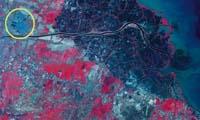The eruption of mud in Indonesia, a human error

On May 29, the eruption of eastern Java mud began. Since then it has thrown 126,000 m3 of mud a day and has covered four square kilometers. The result has been the death of thirteen people and four nearby villages and factories have been left under the mud.
At first it was thought that the eruption was caused by an earthquake two days earlier, but now, researchers at the University of Durham claim that it is due to human action, which is due to the fact that adequate coverage was not used in a survey. In search of gas, they reached a depth higher than necessary without protection measures, and believe that the pressure there maintained caused the passage of the material to the surface.
This material, the mud, has caused great damage and, although they have managed to channel it towards the sea, there is still much risk in the area. Now they are about to launch a plan to stop the eruption, which consists of introducing heavy balls chained in the mouth of the eruption. It is believed that once the mud discovers these structures in its path, friction will take away strength, thus reducing the flow of mud in three quarters.





